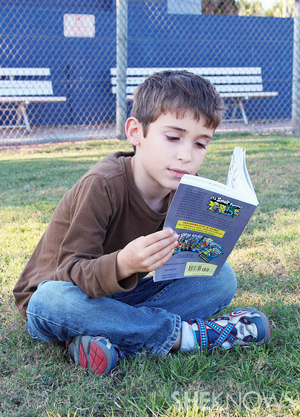
When Maria Mora’s son Simon was 18 months old, she began noticing patterns in his behavior and a frequent, unusual squeezing motion that resembled a seizure.
a long, bumpy road
to diagnosis
As her concerns grew, she made an appointment with his pediatrician. That appointment was the first step on a bumpy road from doctor to doctor, and diagnosis to diagnosis.

At only 7, my son is young for an Asperger’s syndrome diagnosis. I credit the relatively early diagnosis to the combined efforts of a psychologist, neuropsychiatrist, occupational therapist, speech-language pathologist, developmental pediatrician and neurologist. When my son was a toddler, an early interventions case worker told me she’d never met anyone like him and assured me he’d receive therapy services from the state. To my dismay, he didn’t. That’s when I really understood that I’d have to fight for him.
Discover six ways to advocate for your special needs child>>
Social insecurity
When my son was a toddler, he didn't play the way his peers did. He never played with others at the park or at gatherings. He never played make believe. As a first-time mom, I figured I was just being too paranoid and tried to relax when he spent hours a day lining toy cars up in intricate patterns on the floor. He had an EEG and was diagnosed with stereotypic movement disorder. I was told not to worry, but after a few weeks of school in a classroom full of 2-year-olds, my son’s teacher came to me with concerns. She was familiar with kids on the autism spectrum and wondered if I'd noticed some behaviors that struck her as consistent with kids with autism. It was relieving to know someone else was seeing what I saw.
More than meltdowns
At home, I struggled to deal with a newborn and my toddler son’s violent meltdowns and rigid obsessions. When he was 3, he had a routine pediatrician appointment and completely lost it when the nurse called him back. I still don’t know what set it off, but he ended up throwing himself against a sharp piece of furniture and nearly injured himself. I’d come equipped with a checklist about Sensory Processing Disorder symptoms, and my pediatrician immediately agreed we needed to get him evaluated by an occupational therapist — and quickly. I remember her saying, “This isn’t the boy I know.” I credit a lot of his progress to her wise decision to send us to OT before a formal diagnosis.
Find out how to deal with Sensory Processing Disorder meltdowns>>
A degree in web searches
As different doctors gave my son different diagnoses, including hyperlexia, Sensory Processing Disorder, chronic motor tic and OCD, I spent hours online looking at videos of children with various developmental disorders. Everything kept pointing to autism. I talked to therapists online and read dozens of blogs. Meanwhile, my son made progress in occupational therapy. It was a huge deal in my house when, at 4, he was able to get his hands dirty without sobbing incoherently. In all my searchings, I discovered a local center for pediatric neuropsychiatry. After going over reports from all of my son’s previous evaluations and after seeing videos and interviewing him, his doctor diagnosed him with Asperger’s syndrome, an autism spectrum disorder.
Autism at school
Thanks to an intensive social skills program that lasted for nearly a year, my son hit the public school system prepared for inclusion in a regular classroom. We've been very fortunate to have a series of teachers who are willing to work with his social and behavioral deficits as well as his strengths. He's now in the gifted program and a guidance group for self management. He continues to struggle at times, but I consider him a huge success story when it comes to early interventions. I know the tween and teen years will be another story, but for now I'm exhaling just a little.
Image credit: Maria Mora
More on autism
Your child has autism. Now what?
Ideas on autism: Building sensory communication with your child
Ways to connect with an autistic child